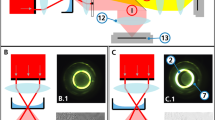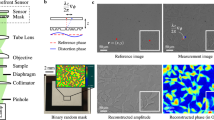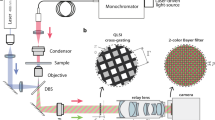Abstract
SEVERAL variable phase-contrast systems have been described. Most of these make use of polarized light in order to obtain variation of phase or amplitude, or both1. An experimental microscope has been constructed by Messrs. Cooke, Troughton and Simms, Ltd., which allows the operator to obtain positive or negative phase-contrast at will, and to control the intensity of either the direct or diffracted light. A 'Soleil' compensator enables retardations ranging from + λ/4 to — λ/4 to be introduced. A full description of this instrument2, together with an account of the work carried out with it in this laboratory, will appear shortly3.
This is a preview of subscription content, access via your institution
Access options
Subscribe to this journal
Receive 51 print issues and online access
$199.00 per year
only $3.90 per issue
Buy this article
- Purchase on Springer Link
- Instant access to full article PDF
Prices may be subject to local taxes which are calculated during checkout
Similar content being viewed by others
References
Hartley, W. G., Nature, 159, 880 (1947). Kastler, A., and Montarnal, R., Nature, 161, 357 (1948). Osterberg, H., J. Opt. Soc. Amer., 37, 726 (1947). Taylor, E. W., Proc. Roy. Soc., A, 190, 422 (1947).
Payne, B. O. (in the press).
Oettlé, A. G. (in the press).
Rheinberg, J., J. Roy. Mic. SoC., 16, 373 (1896); 19, 142 (1899).
Author information
Authors and Affiliations
Rights and permissions
About this article
Cite this article
BARER, R. Variable Colour-Amplitude Phase-Contrast Microscopy. Nature 164, 1087–1088 (1949). https://doi.org/10.1038/1641087b0
Issue Date:
DOI: https://doi.org/10.1038/1641087b0
Comments
By submitting a comment you agree to abide by our Terms and Community Guidelines. If you find something abusive or that does not comply with our terms or guidelines please flag it as inappropriate.



